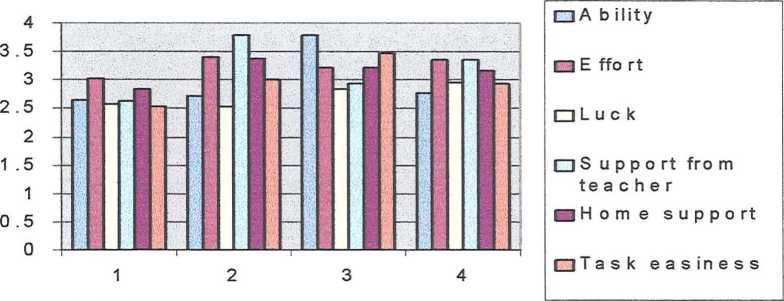TLl
progress. Those attributing success to support at home perceived less that Practical
work could promote these aspects. 5th graders attributing their success to support from
the teacher perceived more frequent deployment of Practical work than those attributing
it to task easiness. 5th graders attributing success to luck perceived less overall that all
teaching methods could promote positive affective attitudes towards mathematics
learning (see e.g. Figure 7.2.1). (also see appendices Table 7.2.1-Table 7.2.5)
Figure 7.2.1: Mean s∞res of 5th graders’ motivation promoted by teaching methods
according to their attribution styles of success in mathematics learning

I=Reading a textbook, 2=Teacher explanation,
3=lndividual work, 4=Whole-class discussion
8th graders attributing success to effort and support from the teacher perceived more
than those attributing success to ability that Teacher explanation could promote positive
affective attitudes. 8th graders attributing success to ability, effort or task easiness
perceived more than those attributing it to support from the teacher that Individual work
could promote their sense of security and sense of progress. 8th graders attributing
success to effort and support from teacher perceived more than those attributing it to
task easiness that Reading a textbook could promote their motivation, sense of security
and sense of progress. 8th graders attributing success to luck overall perceived less that
all teaching methods could promote positive affective attitudes towards mathematics
learning (see Figure 7.2.2). (also see appendices Table 7.2.6~Table 7.2.10).
227
More intriguing information
1. Banking Supervision in Integrated Financial Markets: Implications for the EU2. The name is absent
3. The name is absent
4. IMPROVING THE UNIVERSITY'S PERFORMANCE IN PUBLIC POLICY EDUCATION
5. The name is absent
6. WP 36 - Women's Preferences or Delineated Policies? The development or part-time work in the Netherlands, Germany and the United Kingdom
7. Impacts of Tourism and Fiscal Expenditure on Remote Islands in Japan: A Panel Data Analysis
8. Business Cycle Dynamics of a New Keynesian Overlapping Generations Model with Progressive Income Taxation
9. Environmental Regulation, Market Power and Price Discrimination in the Agricultural Chemical Industry
10. HACCP AND MEAT AND POULTRY INSPECTION